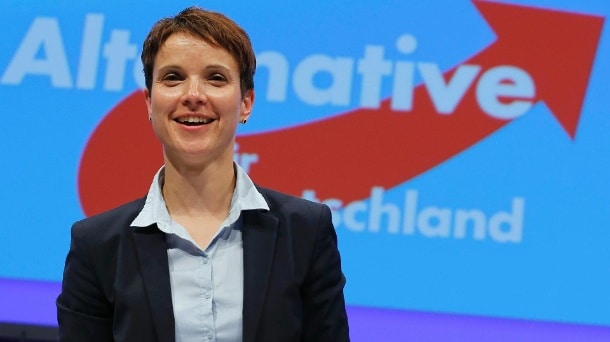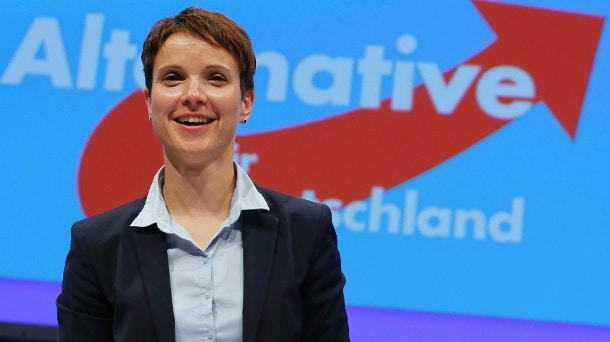
The final results of the local elections in the central German state of Hesse last Sunday were a cold shower for the ruling coalition. The new opposition party Alternative for Germany (AfD) won seats in every municipal council in that state, receiving an unprecedented 16.2% of the vote in Hesse’s capital of Wiesbaden. They even pulled in approximately 12% in cosmopolitan Frankfurt am Main – the largest city in Hesse, where voter turnout was a record low (37.3%).
All in all, the AfD picked up more than twice (!) as many votes in Hesse as had been predicted. This success will likely be repeated during the state parliament elections in Baden-Württemberg, Rheinland-Pfalz, and Saxony-Anhalt on March 13.
Such a showing is undoubtedly the direct and logical outcome of the chancellor’s policy on migrants, which is viewed by many Germans as a betrayal of their national interests. Given that Hesse is one of the most prosperous states in Germany, the March voting patterns showed a drastic shift in electoral preferences. The one and a half million socially disruptive Middle Eastern asylum seekers currently on German territory, in addition to the growing indignation of ordinary burghers over these unwanted guests, are certainly burdens for which Merkel must accept full electoral responsibility.
At the recent EU-Turkey summit, the Turkish Prime Minister Ahmet Dovutoglu wore a condescending smile as he compelled the European leaders to accept Ankara’s demands. Naturally he held the upper hand since he had 2.7 million migrants on his own soil who were on the brink of leaving for Europe. As a result, EU leaders granted Turkey’s surprise request to double its compensation for housing refugees, from €3 to €6 billion by the end of 2018.
The concessions that were made on the issues of human rights and visa liberalization for Turkish citizens raise concerns even among established German politicians. Angela Merkel has come under harsh criticism not only from the opposition, but its tried-and-true ally, the Christian Social Union in Bavaria, as well.
The CSU’s Secretary General Andreas Scheuer strongly opposed easing and then canceling visas for Turkish citizens and the perspective Turkey’s admission into the EU considering that as unacceptable concessions. Former head of the CSU Bundestag parliamentary faction Hans-Peter Friedrich said that Ankara plays “cat and mouse” game with the EU.
German opposition offers even stronger criticism. German Greens Party faction leader Anton Hofreiter believed the European Union is overly dependent on Erdoğan over the migrant issue resulting in Turkish dictate on how Europe should react on catastrophic Ankara’s human rights record. The Left Party and Free Democrats have also expressed solidarity with this stance.
With such clearly articulated political pressure on the chancellor, shifts in public opinion take on critical importance. A report by Tagesspiegel magazine on the situation in Pforzheim, a town of nearly 120,000 in the federal state of Baden-Württemberg, where approval ratings for the AfD party have been rising rapidly for the last two years, is telling of itself:
The town has more unemployed residents and refugees per capita than the average municipality in Germany. A large plant that used to produce electrical equipment has shut down, leaving several hundred people jobless. Now that facility houses three hundred refugees. About 250 new refugees join the 1,500-strong migrant community each month. They are living in 30 hostels and dormitories and making no effort to integrate themselves into the society of their host country. Vigilantes patrol the streets to protect public order, despite the fact that the authorities have denied them the right to wear uniforms or even armbands.
Bernd Grimmer, the head of the local AfD branch, says that unlike other political organizations, Alternative for Germany is serious about meeting public demands for basic democratic norms. E.g. only this party can afford rallying against the deployment of the US nuclear arms in Germany or commemorate the deadly WWII bombing of Pforzheim by the Royal Air Force, when 18 thousand civilians were killed in 22 minutes.
According to a survey conducted among AfD’s members ahead of the party’s convention, which is scheduled for April, their supporters want to abolish most of the reforms that have been carried out in Germany over the last 20 years. Ninety-six percent of the respondents demanded a dramatic reduction in the number of people granted asylum in Germany, as well as strict standards for the educational levels and qualifications of immigrants. The AfD’s draft resolution insists that only asylum seekers with moderate-to-high levels of professional training be allowed to enter the country, except for those coming from other EU states.
As a result, the party’s position is strengthening each day. It is already represented in the Landtags of Bremen, Hamburg, Saxony, Brandenburg, and Thuringia. Should it gain seats in the Landtags of Baden-Württemberg, Rheinland-Pfalz, and Saxony-Anhalt (which is the most likely outcome), it will then have a voice in 8 out of 16 state parliaments. This fact would have a significant impact on the Bundestag election in autumn 2017.
The issue of migrants has risen to the fore in Germany. Angela Merkel realizes that relying on Erdoğan was a mistake. The chancellor is trying at all costs to avoid any scandals that might undermine her pre-election approval rating. She’ll do her best to suppress any damaging news, such as, for instance, reports about Turkey supporting the Islamic State militant group etc. But nonetheless, the incumbent chancellor will have to pay a high political price for flirting with the Erdoğan regime and recklessly letting migrants flood into Europe.
Reprinted with permission from the Strategic Culture Foundation.

